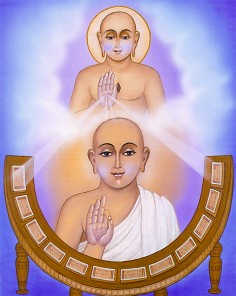Sixteenth Lecture: The Ten Conditions of Perfect Chastity
O long-lived (Gambūsvāmin)! I (Sudharman) have heard the following Discourse from the Venerable (Mahāvīra):
Here,[1] indeed, the venerable Sthaviras have declared ten conditions for the realisation of celibacy, by hearing and understanding which the monks will reach a high degree of self-discipline, of Saṃvara,[2] and of contemplation, will be well protected (by the three Guptis), will guard their senses, guard their chastity, and will thus never be remiss (in the attendance on their religious duties).
What, then, are those ten conditions for the realisation of celibacy as declared by the venerable Sthaviras, by hearing and understanding which the monks will reach a high degree of self-discipline, of Saṃvara, and of contemplation, will be well protected (by the three Guptis), will guard their senses, guard their chastity, and will thus never be remiss (in the attendance on their religious duties)?
These, then, are the ten conditions for the realisation of celibacy, etc. (all down to) duties.
- A Nirgrantha may occupy various places for sleep or rest;[3] but a Nirgrantha should not occupy places, for sleep or rest, frequented by women, cattle, or eunuchs. The preceptor has explained the reason for this. If a Nirgrantha occupies places for sleep or rest, frequented by women, cattle, or eunuchs, then, though he be chaste, there may arise a doubt with regard to his chastity, or a sensual desire, or a feeling of remorse, or he will break the rules, or he will become a slave to passion, or he will acquire a dangerous illness of long duration, or he will desert the faith which the Kēvalin has proclaimed. Therefore a Nirgrantha should not occupy places, for sleep or rest, frequented by women, cattle, or eunuchs.
- A Nirgrantha should not converse with women.[4] The preceptor has explained the reason for this. If a Nirgrantha converses with women, etc. (all as above).
- A Nirgrantha should not sit together with women on the same seat. The preceptor has explained the reason for this. If a Nirgrantha sits on the same seat with women, etc. (all as above).
- A Nirgrantha should not look at, or contemplate, the charms and beauties of women. (The rest similar as above.)
- A Nirgrantha should not, behind a screen, or curtain, or wall, listen to the screeching or screaming or singing or laughing or giggling or crying of women. (The rest similar as above.)
- A Nirgrantha should not recall to his memory the pleasure and amusements which in the past he enjoyed together with women. (The rest similar as above.)
- A Nirgrantha should not eat well-dressed food. (The rest similar as above.)
- A Nirgrantha should not eat or drink to excess. (The rest similar as above.)
- A Nirgrantha should not wear ornaments. The preceptor has explained the reason for this. If he wears ornaments, or adorns his body, he might become an object of desire to women. When he is an object of desire to women, then, etc. (the rest as in 1).
- A Nirgrantha should not care for sounds, colours, tastes, smells, and feelings. (The rest similar as above.)
Here are some verses (to the same effect):[5]
A monk should take up a detached lodging, free from, and not frequented by women, to preserve his chastity. (1)
A chaste monk should avoid talking with women, which delights the mind and foments love and passion. (2)
A chaste monk should always avoid the company of, and frequent conversation with women. (3)
A chaste monk should avoid observing the body, limbs, and figure of women, their pleasant prattle and oglings. (4)
A chaste monk should avoid listening to the screeching, screaming, singing, laughing, giggling, and crying of women. (5)
A chaste monk should never recall to his mind how he had laughed and played with women, and had enjoyed them, how they became jealous, and what tricks he played to frighten them. (6)
A chaste monk should always avoid well-dressed food and drink which will soon raise his sensuality. (7)
A chaste monk should always eat his food, collected according to the rules, for the sustenance of life, in the prescribed quantity, and at the right time; concentrated in his thoughts he should not eat to excess. (8)
A chaste monk should abstain from ornaments, he should not adorn his body after the fashion of amorous people. (9)
He should always abstain from the five orders of pleasant things: sounds, colours, smells, tastes, and feelings of touch. (10)
A lodging frequented by women, their pleasant talk, their company, and looking at their charms; (11)
Their screeching, screaming, singing, and laughing, eating and sleeping together with them; well-dressed food and drink, or partaking of them to excess; (12)
And ornaments and finery:[6] these pleasant things, which are hard to leave, are like the poison Tālapuṭa,[7] for a man who seeks after the true Self. (13)
He should, once for all, abandon pleasant things which are hard to leave; and concentrated in his thoughts he should avoid whatever casts a doubt on his chastity. (14)
A monk should be the steadfast charioteer, as it were, of the Law in the park of the Law,[8] a vessel of righteousness, content, restrained, attentive to the duties of a chaste monk. (15)
The gods, Dānavas, Gandharvas, Yakṣas, Rākṣasas, and Kinnaras pay homage to a chaste monk who performs his difficult duties. (16)
This unchangeable, permanent, and eternal Law has been proclaimed by the Jinas; through it the Siddhas have reached perfection, and others will reach it. (17)
Thus I say.
The word "here" is explained as meaning "in this religion of the Jainas." See Second Lecture, note 3.
Saṃvara is the stopping of the āsravas by means of the Samitis and Guptis, see Twelfth Lecture, note 9.
Iṭṭhaṃ cha, i.e. iṣṭaṃ cha. The commentators connect the words with the second part of the sentence. By giving to cha the meaning of api they interpret the two words in question as meaning "though very pleasant."
Tālauḍa. According to the Dīpikā it is a poison which kills by merely touching the palate (tālukasparśanamātrād ēva); but this is a mere guess prompted by a wrong etymology. Tālauḍa stands perhaps for tālakūṭa, which may have been a variant of kālakūṭa, the deadly poison swallowed by Śiva.
 Ganadhar Sudharma Swami
Ganadhar Sudharma Swami
